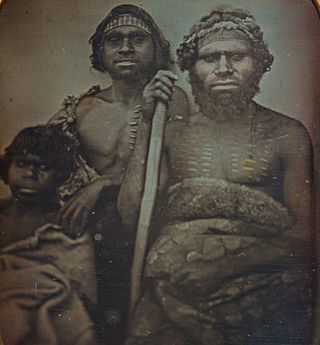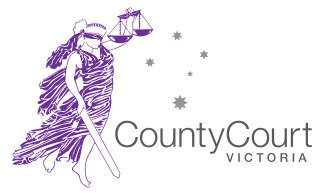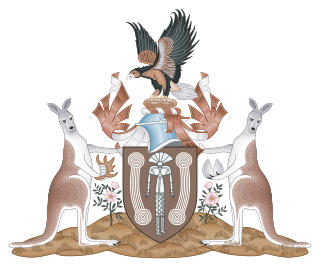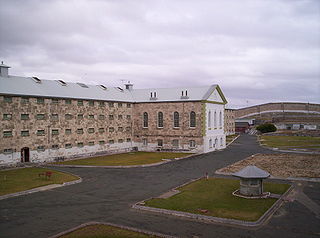Related Research Articles

Koori is a demonym for Aboriginal Australians from a region that approximately corresponds to southern New South Wales and Victoria. The word derives from the Indigenous language Awabakal clan, Worimi nation, Gathang language|Awabakal]]. For some people and groups, it has been described as a reclaiming of Indigenous language and culture, as opposed to relying on European titles such as "Aboriginal". The term is also used with reference to institutions involving Koori communities and individuals, such as the Koori Court, Koori Radio and Koori Knockout.

In England and Wales, a youth offending team (YOT) is a multi-agency team that is coordinated by a local authority and overseen by the Youth Justice Board. It deals with young offenders, sets up community services and reparation plans, and attempts to prevent youth recidivism and incarceration. YOTs were set up following the Crime and Disorder Act 1998 with the intention of reducing the risk of young people offending and re-offending, and to provide counsel and rehabilitation to those who do offend. Youth offending teams engage in a wide variety of work with young offenders in order to achieve their aims. YOTs supervise young people who have been ordered by the court to serve sentences in the community or in the secure estate. Sometimes, teams organise meetings between offenders and victims to encourage apologies and reparation.
A Koori Court is a separate division of the Magistrates', County and Children's Courts of Victoria, Australia. The Koori Court (Magistrates), Children's Koori Court, and County Koori Court hear selected cases, where Indigenous Australians have identified as such and requested the case be transferred to it. The first Koori Court was established in Shepparton in 2002. Koori Court aims to reduce recidivism by involving Elders, other respected persons in the Aboriginal community, and court advisors to provide information about the background of the defendant, and to advise on culturally appropriate sentences.

The County Court of Victoria is the intermediate court in the Australian state of Victoria. It is equivalent to district courts in the other states.
The Bureau of Crime Statistics and Research (BOCSAR), also known as NSW Bureau of Crime Statistics and Research, is an agency of the Department of Communities and Justice responsible for research into crime and criminal justice and evaluation of the initiatives designed to reduce crime and reoffending in the state of New South Wales, Australia.

The Children's Court of New South Wales is a court within the Australian court hierarchy established in 1905. The current iteration was established on 18 January 1988 pursuant to the Children's Court Act 1987 (NSW) which deals with criminal offences committed by children aged over 10 years and under 18 years, as well as with proceedings relating to the care and protection of children. The court is located in the Parramatta Justice Precinct.

The Local Court of the Northern Territory is one of two levels of court in the Northern Territory of Australia. It has jurisdiction in civil disputes up to A$250,000, and in criminal cases in the trial of summary offences, and also deals with preliminary matters for indictable offences which are then heard by the Supreme Court of the Northern Territory. There are local courts held in Darwin, Northern Territory, Alice Springs, Katherine, Tennant Creek, and some "bush courts" in remote locations.
In several countries including Australia, the United States, the United Kingdom, Canada, and South Africa, a community court is a neighborhood-focused problem-solving court that applies a problem-solving approach to local crime and safety concerns. Community courts can take many forms, but all strive to create new relationships, both within the justice system and with outside stakeholders such as residents, merchants, churches and schools. Community courts emphasize collaboration, crime prevention, and improved outcomes, including lower recidivism and safer communities. Community courts are also sometimes referred to as community or neighborhood justice centers.
A diversion program, also known as a pretrial diversion program or pretrial intervention program, in the criminal justice system is a form of pretrial sentencing that helps remedy behavior leading to the arrest. Administered by the judicial or law enforcement systems, they often allow the offender to avoid conviction and include a rehabilitation program to prevent future criminal acts. Availability and the operation of such systems differ in different countries.
The Children's Court of Victoria is a statutory court created in Victoria, Australia. The court deals with criminal offences alleged to be committed by children aged between 10 and 17 and with proceedings concerning children under the age of 17 relating to the care and protection of children.
Aboriginal Community Court, or Aboriginal court was the name given to the specialised courts dealing with Indigenous Australian offenders in the state of Western Australia between 2006 and 2015.
Indigenous Australians are both convicted of crimes and imprisoned at a disproportionately higher rate in Australia, as well as being over-represented as victims of crime. As of September 2019, Aboriginal and Torres Strait Islander prisoners represented 28% of the total adult prisoner population, while accounting for 2% of the general adult population. Various explanations have been given for this over-representation, both historical and more recent. Federal and state governments and Indigenous groups have responded with various analyses, programs and measures.

Punishment in Australia arises when an individual has been accused or convicted of breaking the law through the Australian criminal justice system. Australia uses prisons, as well as community corrections. When awaiting trial, prisoners may be kept in specialised remand centres or within other prisons.
The Aboriginal Legal Service (NSW/ACT) (ALS), known also as Aboriginal Legal Service, is a community-run organisation in New South Wales and the Australian Capital Territory, founded in 1970 to provide legal services to Aboriginal Australians and Torres Strait Islanders and based in the inner-Sydney suburb of Redfern. It now has branches across NSW and ACT, with its head office in Castlereagh Street, Sydney and a branch office in Regent Street, Redfern.

Juvenile detention in the Northern Territory is administered by Territory Families, since a departmental reorganisation following the Labor victory at the August 2016 Northern Territory general election. Juvenile detention is mostly operated through two facilities - the Alice Springs Juvenile Holding Centre in Alice Springs, and the Don Dale Juvenile Detention Centre in eastern Darwin. These had previously been administered by the Department of Correctional Services. A juvenile is a child between the age of 10 and 17.
The New South Wales Department of Communities and Justice, a department of the Government of New South Wales, is responsible for the delivery of services to some of the most disadvantaged individuals, families and communities; and the administration and development of a just and equitable legal system of courts, tribunals, laws and other mechanisms that further the principles of justice in the state of New South Wales, Australia. It also provides services to children and young people, families, people who are homeless, people with a disability, their families and carers, women, and older people. The department is the lead agency of the Stronger Communities cluster of the New South Wales government.
Murri Courts are a type of specialist community court for sentencing Aboriginal and Torres Strait Islander people in Queensland, Australia. The first Murri Court was established in Brisbane in August 2002, with more being established throughout the state over the next 10 years, catering for both adult and young offenders, under the Magistrates and Children's Court networks. After being closed down by the government in September 2012 as a cost-cutting exercise, they were reopened in April 2016 under the new Palaszczuk government. As of July 2022 there are Murri Courts in 15 locations throughout Queensland.
The Nunga Court, also known as Aboriginal Sentencing Court, is a type of specialist community court for sentencing Aboriginal people in South Australia. Such courts exist at several locations throughout the state, as a sentencing option for eligible Aboriginal and Torres Strait Islander offenders who plead guilty of an offence.
An Indigenous court, also known as Aboriginal court, First Nations court, and other locally relevant terms, usually refers to specialist sentencing courts or modified court procedures for offenders who are Indigenous peoples of a colonised country. They include:
The Sentencing Advisory Council of Victoria is an independent statutory body that was established by the Victorian Government in 2004 to conduct research on sentencing in Victoria, Australia. The Council comprises a board of between 11 and 14 directors, who are supported by a secretariat. In Australia, there are also sentencing councils in New South Wales, Queensland and Tasmania. There are also Sentencing Councils in some overseas jurisdictions, such as England and Wales and Scotland
References
- ↑ Harding, Janina (1993). "Koori". Children Australia. 18 (1): 19. doi:10.1017/s103507720000328x. ISSN 1035-0772. S2CID 242265716.
- 1 2 3 Speakman, Mark (6 February 2019). "New Youth Koori Court at Surry Hills". Juvenile Justice NSW . Media release. Retrieved 22 April 2019.
- 1 2 3 "Youth Koori Court". Children's Court of New South Wales. 13 August 2020. Retrieved 24 July 2022.
 Text may have been copied from this source, which is available under a Attribution 4.0 International (CC BY 4.0) licence. (See here).
Text may have been copied from this source, which is available under a Attribution 4.0 International (CC BY 4.0) licence. (See here). - ↑ Wahlquist, Calla (6 May 2018). "Indigenous elders urge expanded Koori courts to help cut juvenile detention time". The Guardian. Retrieved 26 May 2018.
- ↑ Wahlquist, Calla (31 May 2018). "Youth Koori court in NSW extended, with $2.7m for three more years". The Guardian . Retrieved 22 April 2019.
- ↑ Speakman, Mark; Lee, Geoff (16 June 2017). "$220,000 Funding boost for Youth Koori Court" (PDF). Media release. New South Wales Government . Retrieved 24 July 2022.
- 1 2 Whitbourn, Michaela (6 February 2019). "'Rehabilitation, not punishment': Youth Koori Court opens in Surry Hills". Sydney Morning Herald . Retrieved 22 April 2019.
- 1 2 Thackray, Lucy; Proust, Keira (20 July 2022). "Youth Koori Court launched in Dubbo to support young Indigenous offenders". ABC News. Australian Broadcasting Corporation . Retrieved 23 July 2022.
- ↑ "What is the Youth Koori Court?". Aboriginal Legal Service (NSW/ACT). Retrieved 24 July 2022.
- ↑ Ooi, Evarn; Rahman, Sara (26 April 2022). The impact of the NSW Youth Koori Court on sentencing and re-offending outcomes (Report). NSW Bureau of Crime Statistics and Research.